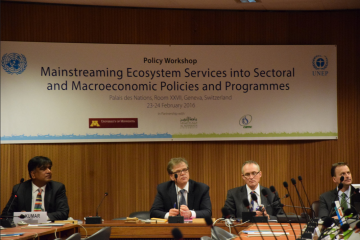
On 23-24 February, the United Nations Environment Programme (UNEP) brought together country representatives from Morocco and Kazakhstan as well as experts from various academic institutions in an interactive workshop in Geneva, Switzerland to explore ways to mainstream natural capital in national policy.
The workshop was convened to address SDG 15, to protect, restore and promote sustainable use of terrestrial ecosystems, sustainably manage forests, combat desertification, and halt and reverse land degradation and halt biodiversity loss. The operational imperative to achieve this SDG comes down to aligning the wheels of conservation and development. It was recognised that the alignment can only be possible through integration of nature into economic decision-making frameworks, possible through credible pathways of mainstreaming natural capital into macroeconomic policies of the countries.
Highlighted through the workshop was the need for a global partnership to disseminate findings and encourage learning through substantive dialogue within and between countries on methods where green growth strategies such as ecosystem valuation can be effectively implemented. To this end, Benjamin Simmons, head of the Green Growth Knowledge Platform (GGKP) presented the GGKP web platform and the global resources it draws together. Audience members, including academics and practitioners, echoed the need for coordinated knowledge management and dissemination on a country basis.
Country participants also identified priority areas for learning, including to improve the technical aspects of water resource management, such as irrigation techniques, crop selection and infrastructure upgrade; and to encourage the transformation to a market system of operation. Serious challenges were also identified, such as how to manage, consolidate, and compile available data on natural capital.
The workshop participants proposed global best practices in capacity development as a solution to address these existing challenges, not only in terms of technical training and understanding, but also to improve capacity at the policy level by raising awareness of the opportunities provided by ecosystem goods and services. To assist in implementing this green growth strategy, it was suggested that international organisations should provide technical support as well as help bridge the gap between research and practical applications through partnership formation and knowledge transfer.
